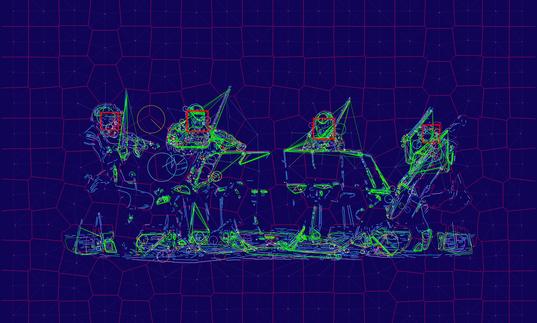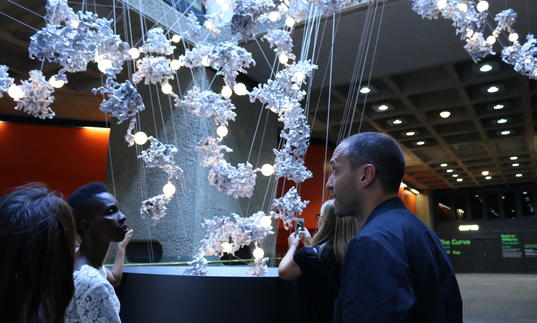New Rituals
Start time: 7.30pm
Aïsha Devi with Asian Dope Boys - Aetherave : 45 mins
Interval: 20 mins
Pan Daijing - Fist Piece: 45 mins
All timings are approximate and subject to change
This performance has a recommended age guidance of 16+ due to nudity and some images that may not be suitable for younger audience members, and contains strobe lighting.

Frances Morgan talks to curator Estela Oliva about these two performances from leading electronic artists exploring spirituality in a digital age.
Aïsha Devi’s ‘Aetherave’ blends organic and synthetic sounds in a hyperreal environment in which the natural becomes defamiliarised and strange. One of the more contemplative tracks on her album DNA Feelings, released on Houndstooth earlier this year, ‘Aetherave’ mingles metallic percussion with insistent synth patterns, while Devi’s voice flows crystal clear in one channel and is subtly chopped and processed in another. Beats are suggested but never quite materialize, hinting at the insistent techno and trance rhythms that power other parts of the album.
This dynamic between ethereal ambience and the heat of the dancefloor motivates Aïsha Devi’s music, and inspires her new multimedia performance in collaboration with Asian Dope Boys, also called Aetherave, which adds another dimension to her recordings with live performance and visuals, creating a ritualistic space for the post-digital age. Aetherave is part of New Rituals, produced by artist and curator Estela Oliva, director of new media project Clon. Oliva’s work explores our relationship with digital culture – and with New Rituals, she says, she wants to investigate how identity and spirituality are perceived in today’s hypermediated world.
Ritual is important to Devi, who was born in Geneva to a Swiss mother and Tibetan-Nepalese father, and she has spoken in interviews about her need to find a sense of her own identity. Her earlier releases under the name Kate Wax hinted at a fascination with the cosmic, with her 2011 album Dust Collision evoking dystopian science fiction soundtracks. Working under her own name since 2013, when she set up the Danse Noire label, her music has evolved to explore inner as much as outer space, drawing on the physics of sound and how it’s experienced in the mind and body, as well as ancient, transformative practices such as meditation and throat-singing.
Trained as a soprano singer, a key experience for Devi was learning kargyraa, the Mongolian practice of overtone singing in which the voice can produce two tones simultaneously. She sees parallels between overtone singing and binaural frequencies, which are aural ‘illusions’ produced by the brain when two different frequencies are played at the same time. Devi, who uses particular frequencies on DNA Feelings, believes that they can induce altered states of consciousness.
It is not surprising that Devi connected with the work of Tianzhuo Chen, the Chinese artist who has described his video and performance work as an attempt to transcend the self and create ‘a state of madness’. ‘We found each other, because we were trying to say the same thing about ancestral symbolism as a counter hypnosis of media and advertisement’, Devi said in a recent interview with Tiny Mix Tapes. Working within similar hyperreal worlds to Devi, Chen critiques late-capitalist excess but also proposes a new, euphorically queer spirituality rooted in the body and its inescapable entanglements with technology. His performance collective, Asian Dope Boys, bring his visions to life in what Devi has described as ‘hi-fi Butoh’.
Beijing-born artist Pan Daijing likewise explores the body’s boundaries in her performances, which combine electronic sound, choreography and film. She is often described as a noise musician, but her most recent album, Lack, which brings together recordings from her performances over a two-year period, shows her to be an artist who works with a multitude of sounds, from the intimate and every day to the harsher textures of electronic noise, along with operatic vocals and repurposed acoustic instruments. In concert, Daijing subverts the expectation of the noise musician hunched over their gear as she performs movements that allude to her background in theatre and dance, often masked and in costume, while sometimes filming the audience in a disconcerting reversal of roles.
Tonight, Daijing performs a version of Fist Piece, a multimedia work that was commissioned initially for last year’s Atonal festival in Berlin, where she lives. A film made in collaboration with artist Ekaterina Rheinhold makes visual some of Daijing’s sonic concerns, and the polarities of intimacy, distance, beauty and alienation that her tactile music contains. Billowing fabrics are juxtaposed with crushed fruit, and repetitive actions – washing, stroking – are performed hypnotically on large screens. Estela Oliva says that this focus on intimacy and female relationships drew her to Daijing’s work, which creates a space for focus and reflection.
Yet Daijing’s music also resists lulling its listeners with repeated sounds. As critic Steph Kretowicz wrote in The Wire magazine, ‘Lack doesn’t allow so much for meditation, forcing the listener to confront its continued presence through interjections of anxious vocal exercises and crashing echoes, industrial scrapes and human ululations. They each refuse a clear cadence and thus the dazed disengagement of repetition.’
Daijing’s use of repetition is instead more critical, asking important questions about power and control. For tonight’s performance she is joined by dancer Gregori Homa, whose hybrid performances as Negroma are, like Daijing’s, generically fluid, situated in both performance art and club culture.
In the post-digital era, says Oliva, ‘Our relationships as individuals, collectives and our surroundings have changed to an extent that we don’t yet understand.’ Both Daijing and Devi create uniquely sensory performances in which both they and the audience are compelled to explore these relationships. For both artists, the question is one of how we inhabit and abandon our bodies, through sound, ritual, repetition and control; through pain, ecstasy, engagement and escape.
Produced by the Barbican in association with Clon
Curated by Estela Oliva
Supported by the Goethe-Institut London
Start time: 7.30pm
Aïsha Devi with Asian Dope Boys - Aetherave: 45 mins
Interval: 20 mins
Pan Daijing - Fist Piece: 45 mins
All timings are approximate and subject to change
This performance has a recommended age guidance of 16+ due to nudity and some images that may not be suitable for younger audience members, and contains strobe lighting.
In an effort to be more sustainable, and in the spirit of The Art of Change, this digital programme is part of a trial we are conducting to discontinue printed freesheets.
Credits
Aetherave
Aïsha Devi music
Tianzhuo Chen direction
Han Yu performer
Yi Li performer
Elaine Edou performer
Fist Piece
Pan Daijing music, concept, peformer, film
Gregori Homa performer
Ekaterina Reinbold film
Discover

Watch: Aïsha Devi 'Mazdâ'
Take a glimpse into the world of Tianzhuo Chen, who directed this music video for Aïsha Devi and will be collaborating with her on this performance.

Listen: Electronic Music on Spotify
Follow our regularly updated Electronic Music playlist for a sample of the music you'll hear across our programme.
You might also like...

+ Leifur James

With Amina Claudine Myers and Carleen Anderson


Barbican Hall
Location
The Barbican Hall is located within the main Barbican building. Head to Level G and follow the signs to find your seating level.
Address
Barbican Centre
Silk Street, London
EC2Y 8DS
Public transport
The Barbican is widely accessible by bus, tube, train and by foot or bicycle. Plan your journey and find more route information in ‘Your Visit’ or book your car parking space in advance.
We’ve plenty of places for you to relax and replenish, from coffee and cake to wood-fired pizzas and full pre-theatre menus
Mobility
Spaces for wheelchair users in row U at the rear of the stalls (up to sixteen, depth of row 180cm) and the back row of the circle (four), both with fold-down companion seats. Some seats in row S of the stalls for people with very limited mobility.
Assistance dogs
Assistance dogs may be taken into the concert hall where there are a limited number of suitable seats in row G of the stalls. If you prefer, you may leave your dog with a member of the cloakroom staff during the performance.
Hearing facility
There is an induction loop in the concert hall. You can use this by adjusting your hearing aid to the ‘T’ setting.
Free large-print programmes
These are available for most of our concerts. Please contact access@barbican.org.uk at least a week beforehand, to prebook a large-print programmme.
For more access information, please visit our Accessibility section.
Plan your visit
Meet friends, grab a drink, drop in to one of the free installations on Level G before the show - here's what else is happening at the Barbican when you visit.









